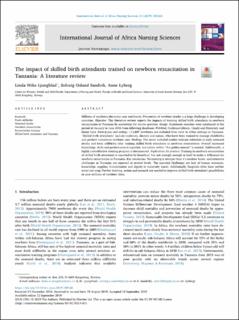| dc.contributor.author | Ljungblad, Linda Wike | |
| dc.contributor.author | Sandvik, Solveig Osland | |
| dc.contributor.author | Lyberg, Anne Marit | |
| dc.date.accessioned | 2020-03-16T09:46:16Z | |
| dc.date.available | 2020-03-16T09:46:16Z | |
| dc.date.created | 2019-10-29T19:15:57Z | |
| dc.date.issued | 2019 | |
| dc.identifier.citation | International Journal of Africa Nursing Sciences. 2019, 11. | en_US |
| dc.identifier.issn | 2214-1391 | |
| dc.identifier.uri | https://hdl.handle.net/11250/2646893 | |
| dc.description | Published by Elsevier Ltd. This is an open access article under the CC BY-NC-ND license | en_US |
| dc.description.abstract | Millions of newborns die every year worldwide. Prevention of newborn deaths is a huge challenge in developing countries. Objective: This literature review reports the impacts of training skilled birth attendants in newborn resuscitation in Tanzania by answering the review question. Design: Systematic searches were conducted in the period of January to June 2016 from following databases: PubMed, Cochrane Library, Cinahl and Maternity and Infant Care. Participants and settings: 113,807 newborns are included from rural to urban settings in Tanzania. “Skilled birth attendants” include midwives, doctors and nurses, who have been trained to manage childbirths and perform immediate newborn care. Findings: The seven included studies indicate reduction in early neonatal deaths and fresh stillbirths after training skilled birth attendants in newborn resuscitation. Overall increased knowledge, skills and performance is reported, and action within “the golden minute” is needed. Additionally, a highly cost-effective training program is documented. Implications for practice: Training in newborn resuscitation of skilled birth attendants is reported to be beneficial, but not strongly enough in itself to make a difference for newborn resuscitation in Tanzania. Key conclusions: No training is stronger than it’s weakest factor, and extensive challenges in Tanzania are reported at several levels. The reported challenges are lack of human resources, knowledge, supplies, humanization and dignity in maternity wards. Additionally, hospitals often have neither water nor soap. Further training, action and research are needed to improve skilled birth attendant’s possibilities to save millions of newborn lives. | en_US |
| dc.language.iso | eng | en_US |
| dc.rights | Attribution-NonCommercial-NoDerivatives 4.0 Internasjonal | * |
| dc.rights.uri | http://creativecommons.org/licenses/by-nc-nd/4.0/deed.no | * |
| dc.title | The impact of skilled birth attendants trained on newborn resuscitation in Tanzania: A literature review | en_US |
| dc.type | Peer reviewed | en_US |
| dc.type | Journal article | en_US |
| dc.description.version | publishedVersion | en_US |
| dc.rights.holder | © 2019 The Authors | en_US |
| dc.source.pagenumber | 9 | en_US |
| dc.source.volume | 11 | en_US |
| dc.source.journal | International Journal of Africa Nursing Sciences | en_US |
| dc.identifier.doi | 10.1016/j.ijans.2019.100168 | |
| dc.identifier.cristin | 1741859 | |
| cristin.ispublished | true | |
| cristin.fulltext | original | |
| cristin.qualitycode | 1 | |

